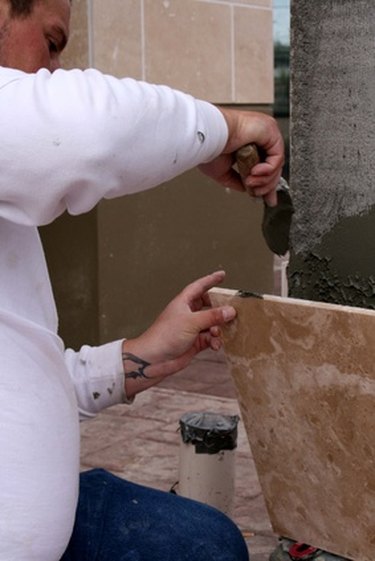Things You'll Need
Impregnating sealer
Foam brush
Lint-free cloth
Topical enhancing sealer

Tile is a popular floor and wall covering for nearly every area of the home. While some types of tile require little to no maintenance to keep them looking great, some types of tile may require sealing.
Natural stone tiles, polished porcelain tiles or crazed ceramic tiles should be sealed prior to grouting to help with clean-up. Tumbled marble tiles, slate tiles and some other forms of rustic tile can also be enhanced by a secondary sealer applied after the grout to deepen and brighten the color. Both of these sealers can be applied to the tiles at any time by the homeowner, as well as during installation by the installer.
Video of the Day
Step 1
Pour out some impregnating sealer into an open-mouthed container. If possible, run a fan or open a window in the room at this time, as the vapors from many sealers may be strong.
Step 2
Dip the foam paint brush into the sealer and apply it to the entire tile in broad strokes. Take care to cover the whole tile. Wait for approximately one hour and then wipe off the excess with a lint-free cloth.
Step 3
Grout the tiles as usual and allow the grout to cure for 24 hours before applying an enhancer. Pour the enhancer out into an open container and use the foam paint brush to apply the enhancer to the tiles. Do not apply the enhancer to the grout; this will cause the grout to appear shiny when dry.
Step 4
Allow the enhancer to sit on the tiles for approximately 30 minutes and then wipe the surface of the tiles with a lint-free cloth.
Tip
If the sealer stays on the tile too long and becomes sticky or built up, simply apply more sealer to the surface of the tile. Allow it to sit for five minutes and then wipe the surface of the tile. The new sealer will soften and lift the old.
A well-sealed tile will bead water up off of its surface; when the water stops beading the tile should be resealed.
Video of the Day